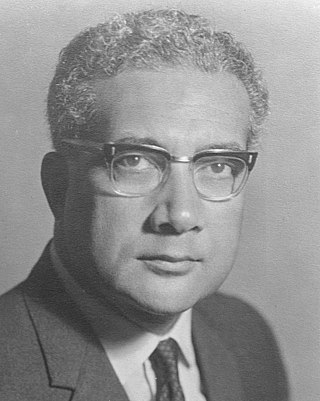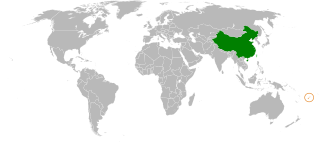
Ratu Sir Kamisese Mara, was a Fijian politician, who served as Chief Minister from 1967 to 1970, when Fiji gained its independence from the United Kingdom, and, apart from one brief interruption in 1987, the first Prime Minister from 1970 to 1992. He subsequently served as President from 1993 to 2000.

Brigadier-General Ratu Epeli Nailatikau, is a Fijian chief who was President of Fiji from 2009 to 2015. He has had a long career in the Military, diplomatic service, and government. From 2001 to 2006 he served as Speaker of the House of Representatives – the lower and more powerful chamber of the Fijian Parliament. He was also the chairman of the Parliamentary Appropriations Committee and of the House Committee. On 8 January 2007, he was appointed the interim Minister for Foreign Affairs and External Trade; he was moved to the post of interim Minister for Provincial Development and Multi-Ethnic Affairs in September 2008. In October 2008, he became Indigenous Affairs Minister "and effectively Great Council of Chiefs chairman". On 17 April 2009, he was appointed Vice-President by the military government.

The prime minister of Fiji is the head of government of the Republic of Fiji. The prime minister is appointed under the terms of the 2013 Constitution. The prime minister is the head of the Cabinet and appoints and dismisses ministers.

The Great Council of Chiefs is a Fijian constitutional body. It previously existed from 1876 to March 2012 and was re-established in May 2023.

Josaia Voreqe "Frank" Bainimarama is a Fijian politician and former naval officer who served as the prime minister of Fiji from 2007 until 2022. A member of the FijiFirst party, which he founded in 2014, he began his career as an officer in the Fijian navy and commander of the Fijian military. He served as the opposition leader from 24 December 2022 despite being suspended from Parliament until 8 March 2023, when he resigned and was replaced by Inia Seruiratu.
Ratu Sir Josefa Lalabalavu Vanayaliyali Sukuna was a Fijian chief, scholar, soldier, and statesman. He is regarded as the forerunner of the post-independence leadership of Fiji. He did more than anybody to lay the groundwork for self-government by fostering the development of modern institutions in Fiji, and although he died a dozen years before independence from the United Kingdom was achieved in 1970, his vision set the course that Fiji was to follow in the years to come.
Fiji Week was a week of prayer meetings and multicultural programmes that took place the week of 4–11 October 2004. Organized at a cost of US$410,000 by a multiracial national committee chaired by the Prime Minister, Laisenia Qarase, Fiji Week was intended to foster reconciliation among Fiji's diverse ethnic communities, especially native Fijians and Indo-Fijians, whose mutual rivalry for political power has dominated Fijian politics for the last generation, and whose relationship has been especially strained since the overthrow of the Indo-Fijian-led government of Mahendra Chaudhry by ethnic Fijian nationalists in the Fiji coup of 2000. Organizers of Fiji Week hoped that it would help to bring about a sense of closure to those events, but the controversy that it generated made this appear difficult to achieve.
Since attaining independence from the United Kingdom on 10 October 1970, Fijian history has been marked by exponential economic growth up to 1987, followed by relative stagnation, caused to a large extent by political instability following two military coups in 1987 and a civilian putsch in 2000. This was followed by another military coup in 2006. Rivalry between indigenous Fijians and Indo-Fijians, rather than ideological differences, have been the most visible cleavage of Fijian politics. Later in 2020, Fiji was hit by the global COVID-19 pandemic, which affected the economy and the daily lives of the people.
Ratu Meli Bogileka is a Fijian politician. He was the Secretary of the People's National Party (PNP) up to its decision to merge into the Party of National Unity (PANU) on 5 March 2006. This merger, an affair complicated by several about-turns, saw Bogileka appointed Secretary of the new PANU..

The "Blue Ribbon campaign" was the name for the campaign promoting support for the controversial legislation introduced by the Fijian Government in 2005 to establish a Reconciliation and Unity Commission. The name specifically comes from the blue ribbons promoted by the ruling United Fiji Party as a sign of support for the bill. This campaign had the strong support of Prime Minister Laisenia Qarase, Attorney General Qoriniasi Bale, and other members of the ruling coalition and was warmly welcomed by imprisoned coup instigator George Speight. The proposed Commission was intended to have the power to grant compensation to victims, and amnesty to perpetrators, of the coup d'état which deposed the elected government in May 2000.

Commodore Frank Bainimarama, Commander of the Republic of Fiji Military Forces, had been a vociferous and uncompromising critic of the government's proposal to establish a Reconciliation and Unity Commission, with the power to grant compensation to victims of the 2000 Fijian coup d'état, and amnesty to perpetrators of it. Among other objections, the Military claimed that its integrity and discipline would be undermined if soldiers who mutinied in the 2000 upheaval were to be pardoned.
Fiji Week celebrations commenced on 7 October 2005, and culminated with Fiji Day on 10 October, the 35th anniversary of Fiji's independence from British colonial rule. The official program focused on forgiveness and unity. It culminated with a day of prayer and fasting on Fiji Day. Schools, towns, and villages featured religious and cultural programs, with major celebrations Suva, Lautoka, and Labasa. The festivities were organized by the Ministry of National Reconciliation and Unity, with the assistance of the Ministry of Home Affairs and Immigration.

The controversial Reconciliation, Tolerance, and Unity Bill promoted by the Fijian government throughout 2005 generated enormous debate, both locally and internationally. The legislation aimed to establish a Commission empowered to compensate victims and pardon perpetrators of the coup d'état that deposed the elected government of Prime Minister Mahendra Chaudhry in May 2000. Support for the legislation came from Japan, while New Zealand opposed it. Australia, too, expressed strong reservations about the legislation, but also called on opponents of it, including the Military of Fiji, to show greater moderation. Non-governmental organizations in a number of countries took positions, also.

The Reconciliation and Unity Commission was a proposed government body to be set up if the Reconciliation, Tolerance, and Unity Bill, which was introduced into the Fijian Parliament on 4 May 2005 was passed. The legislation proposed to empower the commission to grant amnesty to perpetrators of the Fiji coup of 2000, and compensation to victims of it from 19 May 2000 through 15 March 2001. The Fijian President would retain a veto over the granting of amnesty.

The tension between Fiji's government and military forces, which had been simmering for more than two years, appeared to escalate in late December 2005. Tension between the government and the military had been simmering throughout the year, with Commodore Bainimarama and other military officers making strongly worded public statements opposing certain government policies, including the early release from prison of persons implicated in the Fiji coup of 2000, and the government's promotion of controversial legislation to establish a Commission with the power to grant amnesty to perpetrators of the coup.

The crisis that saw a virtual breakdown in relations between Fiji's government and military forces in late 2005 and early 2006, generated fears of civil unrest and even a military coup. The dismissing of Lieutenant Colonel Jone Baledrokadroka, the Acting Land Force Commander, for alleged insubordination on 12 January 2006 was coupled with unusual deployments of troops and naval vessels. Both before and after it was resolved on 16 January with a truce brokered by Acting President Ratu Joni Madraiwiwi, the crisis generated a great deal of comment.

The Republic of the Fiji Islands was the first Pacific Island country to establish diplomatic relations with the People's Republic of China, in 1975. China established an embassy in Fiji in 1976, and Fiji opened its embassy in China in 2001.

Ratu Josefa Iloilovatu Uluivuda, was a Fijian politician who served as the 3rd President of Fiji from 2000 until 2009, excluding a brief period from 5 December 2006 to 4 January 2007. He held the traditional title of Tui Vuda, the paramount chief of the Vuda district in Ba Province on Fiji's northwest coast. Like many Fijian people, he rarely used his surname and was known simply as Josefa Iloilo. He announced on 28 July 2009 that he would be leaving office on 30 July. At the age of 88, he was the world's oldest head of state.
A series of events took place in the Pacific republic of Fiji in 2006, involving an ongoing public feud between the government and military. Tensions took a dramatic turn for the worse on 11–13 January, with reports of unusual troop and naval deployments, crisis meetings of the National Security Council, and the erection of police roadblocks. Rumours also swept the capital that the Military Commander, Commodore Frank Bainimarama, had been arrested by the police on government orders, but the Military denied this. The crisis came to a head on the 13th, with Bainimarama announcing that he had dismissed the Acting Land Force Commander, Lieutenant Colonel Jone Baledrokadroka for insubordination. This event was a precursor to the military coup that finally took place on 5 December 2006.






